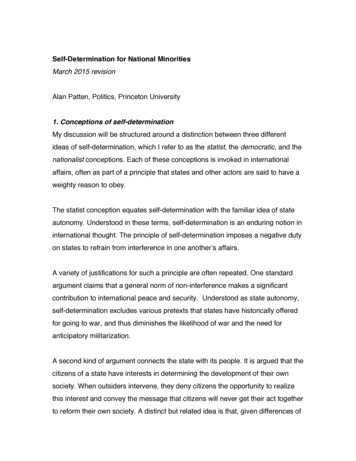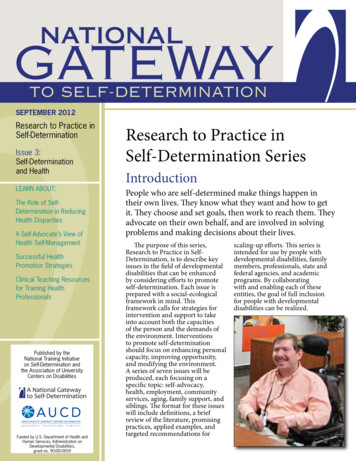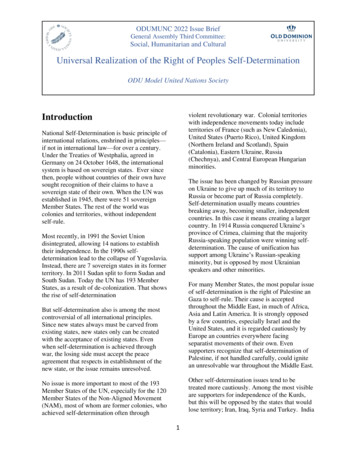
Transcription
Self-Determination for National MinoritiesMarch 2015 revisionAlan Patten, Politics, Princeton University1. Conceptions of self-determinationMy discussion will be structured around a distinction between three differentideas of self-determination, which I refer to as the statist, the democratic, and thenationalist conceptions. Each of these conceptions is invoked in internationalaffairs, often as part of a principle that states and other actors are said to have aweighty reason to obey.The statist conception equates self-determination with the familiar idea of stateautonomy. Understood in these terms, self-determination is an enduring notion ininternational thought. The principle of self-determination imposes a negative dutyon states to refrain from interference in one another’s affairs.A variety of justifications for such a principle are often repeated. One standardargument claims that a general norm of non-interference makes a significantcontribution to international peace and security. Understood as state autonomy,self-determination excludes various pretexts that states have historically offeredfor going to war, and thus diminishes the likelihood of war and the need foranticipatory militarization.A second kind of argument connects the state with its people. It is argued that thecitizens of a state have interests in determining the development of their ownsociety. When outsiders intervene, they deny citizens the opportunity to realizethis interest and convey the message that citizens will never get their act togetherto reform their own society. A distinct but related idea is that, given differences of
2culture and tradition, outsiders are at significant risk of misjudging the needs of asociety targeted for intervention. One size does not fit all, and thus states haveno business imposing what works in their own societies onto other peoples andsocieties. Michael Walzer’s influential attempt to ground the “moral standing ofstates” in a notion of “communal integrity” draws on both of these ideas.1 Apresumption against foreign interventions leaves space for the politicalcommunity’s own politics to determine outcomes, and it reflects the privilegedepistemic vantage-point of citizens of that community relative to outsiders.The democratic conception of self-determination takes as its point of departurethis shift in moral accent from state to people. Suppose we accept for themoment that self-determination matters because of the value for a people ofbeing able to shape and determine its own affairs. We must immediately confrontthe possibility that a state’s structures might themselves be substantialimpediments to a state population’s interests in this area. The internal characterof the political system in authoritarian states may be such that nobody could thinkthere is any determination by the people of their own affairs that could be worthyof protection or respect.The democratic conception takes seriously this possibility and insists that selfdetermination involves both a negative and a positive condition. Negatively, itrequires non-intervention. But, positively, it requires the presence of institutionalstructures through which the people can engage in a meaningful way in theshaping and determining of their own affairs.Paradigmatically, those institutional structures are democratic ones, but theapproach need not rule out the possibility that a broader range of inclusivestructures, such as Rawls’s “decent consultation hierarchy,” might satisfy thepositive condition.2 There is also scope, under the heading of the positivecondition, to interpret the requirement of democracy or inclusion in a more or less
3procedural manner. The requirement might focus narrowly on how collectivedecisions for the society get made, or it might take a broader look at the degreeto which the individuals who make up the people are treated as full or equalmembers.3Since the negative and positive conditions may pull in different directions, there isno reason, on the democratic conception, to think that a concern for selfdetermination always implies non-interference. In some cases, there may bereasons internal to the idea of self-determination for thinking that some form ofinterference or intervention is justified.4 The international community mightsupport human rights campaigners or a democratization movement in some stateand believe reasonably that they are promoting self-determination along one ofits two required dimensions.The nationalist conception of self-determination focuses on a condition that ishighlighted by neither the statist nor the democratic views. On the nationalistview, the world is home to a number of different socio-cultural groups that can bethought of as nations or peoples. States may be pivotal in creating andmaintaining nations and peoples, but, as a conceptual matter, such groups arenot equivalent to the populations of states. A particular state may be home tomore than one national group, and a particular national group may be spreadacross more than one state.On the nationalist conception, it is peoples understood in this socio-cultural sensethat ought to be self-determining. Self-determination, in other words, has aboundary condition. A people is self-determining only if it is able to determine itsown affairs through its own political structures. For this condition to be satisfied,there needs to be congruence between the boundaries of the political unit andthe boundaries of the socio-cultural one.5
4I shall have much more to say about the nationalist conception throughout thispaper. For now, let me draw attention to a point that has already been implicit inthe language used to describe the three conceptions. Associated with eachconception is a specific claim about who the subject or “self” is of selfdetermination. If the statist conception focuses on the self-determination of thestate, and the democratic conception highlights the self-determination of thepeople defined as the citizens of the state, then the nationalist conception’sconcern is with the self-determination of peoples, where peoples are understoodas socio-cultural groups having their own sense of national identity.My aim in this paper is to reflect on which of these conceptions of selfdetermination is most suitable for adoption into a principle of international law orpractice. To keep the discussion focused, I shall assume, for the most part, thatthe democratic conception is more acceptable than the statist one. Most politicaltheorists gravitate towards a version of the democratic view, and even selfidentifying statists, such as Walzer, seem to incorporate weak versions of thedemocratic conception’s positive condition into their idea of self-determination.6The main question to be considered is whether the democratic conception is allthat is needed, or whether a further step to the nationalist conception is alsoworth taking. For reasons that will be explored below, many commentators aredubious about the nationalist view. The democratic conception, they suggest, isbased on important values of democracy, inclusion, and equal membership thatare plausibly regarded as matters of fundamental justice. By contrast, the basicconcepts and normative commitments associated with the nationalist conceptionare harder to pin down, and the values involved – to the extent that they can beidentified – do not seem like matters of grave moral significance.Although there is much to be said for this skeptical position, I shall take theopposing view. I think that failure of self-determination in the nationalist senseshould sometimes be regarded as a matter of legitimate international concern. A
5failure to make space for national self-determination does involve a kind ofinjustice – even if not a “fundamental” injustice – and it is reasonable for theinternational community to take proportionate measures aimed at preventing andremedying that situation.2. A moderate version of the nationalist conceptionThe nationalist conception is often characterized in ways that make it seemextreme and unpalatable. One instance of this tendency occurs when it isassumed that, on the nationalist conception, the boundary condition can besubstituted for the positive condition. This version of the nationalist conceptionholds that it does not matter for self-determination whether democratic structuresare in place so long as the authoritarian, or non-democratic, structures that are inplace are in some sense controlled by members of the relevant national group,so that the boundary condition is met.A second tendency in the interpretation of the nationalist conception is to assumethat the congruence between political and national that it calls for must take theform of the nation-state. According to this version of the nationalist conception,states should not contain more than one nation, and nations should not bespread over more than one state. Once this understanding of the nationalistconception is locked into place, it is but a few short steps to the worry – famouslyarticulated by Wilson’s Secretary of State, Robert Lansing - that selfdetermination is a “phrase loaded with dynamite.” Given that state boundaries donot align very well with existing national groups, a principle of national selfdetermination will immediately raise the specter of endless instability and violentconflict.The version of the nationalist conception that I shall defend avoids both of thesetendencies, and in this sense is more moderate than the view that critics oftenhave in mind. On a moderate nationalist view, it is necessary that the negative
6condition, the positive condition and a boundary condition each be satisfied. It isnot enough for self-determination that the state be free from external interferenceand that it constitute itself in a democratic or broadly inclusive manner. Itsdemocratic or inclusive structures must themselves be organized within particularboundaries so as to empower national groups. Equally, however, it is notsufficient that the boundary condition be satisfied, if the positive or negativeconditions are not. The moderate nationalist conception rejects the idea that, solong as national groups are given space to determine their affairs in a way thatfits with their own beliefs and traditions, they are self-determining even if theydetermine those affairs in an authoritarian manner.7 On the moderate nationalistview, in other words, the relationship between the boundary and positiveconditions is one of addition rather than substitution. Thus the view offers littlecover to actual or aspiring nationalist authoritarian regimes that insist on beingleft alone by the international community.A second distinctive feature of the moderate nationalist conception is that it doesnot claim that national minorities ought, in general, to possess their own state. Tosatisfy the boundary condition, it is sufficient that some meaningful form ofinternal autonomy be given to national minorities. This may involve federalism, ordevolution, or some other form of regional autonomy, which seeks to empower anational minority by making them the local majority within a territorial unit of thestate. Or it might conceivably involve some form of non-territorial autonomy inwhich the structures of representation are designed in such a way that a nationalminority has control over some of its own affairs.8The moderate nationalist conception, as I understand it, thus focuses on internalrather than external state boundaries, and in this sense on internal rather thanexternal self-determination.9 It does not rule out the possibility that external selfdetermination (e.g. secession) might be an appropriate remedy for a persistent,unjustifiable failure on the part of a state to offer internal self-determination to
7national minorities. But the moderate nationalist conception does not imply anygeneral or “primary” right on the part of national minorities to choose their ownpolitical status.10So the version of the nationalist conception that I want to defend is moderate intwo key respects. First, the conception accepts that democratic or inclusivestructures are an essential condition of self-determination and thus avoids theobjection that it ends up legitimating authoritarian nationalist regimes. And,second, it regards internal sub-state political arrangements as an adequatevehicle for the self-determination of national minorities: there is no requirementthat every national group have its own state. Of course, it is one thing toannounce this moderate position as the view to be defended; it is another todefend it with an argument that really does justify the moderate conceptionwithout entailing the extreme and unpalatable positions with which the nationalistconception is often associated. Without such an argument, the restriction to themoderate nationalist position will seem ad hoc, and the arguments themselveswill seem untenable.I think the arguments I lay out below do favor the moderate nationalist conceptionover other variants of the nationalist view. They point to reasons for thinking ofthe boundary condition as a supplement to, rather than a substitute for, thepositive condition. And they point to reasons for thinking that self-determinationappropriately takes an internal rather than an external form in the usualcircumstances of modern pluralistic societies.3. Subject populations and indigenous peoplesOne approach to evaluating the competing conceptions of self-determination isby asking which is most consistent with widely endorsed developments ininternational law and practice. A virtue of the nationalist conception is that it canhelp to make sense of some important cases. The subject populations of
8overseas colonies and indigenous peoples are two categories of cases in whichmany commentators would agree that there are strong claims to selfdetermination. It is widely thought that the populations of overseas empires oughtto have had the right freely to determine their own political status: it wasappropriately up to them whether they wished to become an integral part of thecolonial state or whether they wished to become an independent state of theirown. This right, and the associated “saltwater test” which limited the right to thepopulations of overseas colonies, was recognized by the international communityin the post-war years.11Likewise, many commentators would accept that indigenous peoples have a rightto self-determination.12 It might not be feasible, in many instances, for suchpeoples to form their own independent states, but they should at least be able toenjoy autonomy or self-government within the larger state in which they findthemselves. In recent years, this right has been formally recognized by theinternational community. The UN Declaration on the Rights of IndigenousPeoples (UNDRIP) (2007) affirms that indigenous peoples have a right to “selfdetermination” (Art. 3), the exercise of which may involve a “right to autonomy orself-government in matters relating to their internal and local affairs” (Art. 4).These cases are significant for our discussion because they involve attributing aright of self-determination to groups that can be understood as social and culturalin character. In neither kind of case is the subject of self-determinationconsidered to be the whole population of an existing or even previously existingstate. In the colonial case, the group wielding the right to self-determination wasin practice often defined by administrative boundaries established by the colonialpower. But these boundaries were clearly not the whole story, since, according tothe saltwater test, a group defined by the same kind of administrative boundariesbut located on the historic territory of the imperial power would not have the sameright. A plausible interpretation of this set of facts is that the subject population of
9an overseas colony possesses a right to self-determination at least, in part,because of its social and cultural distinctiveness vis-à-vis the population of thecolonial power.13The connection with the nationalist conception is even clearer in the case of selfdetermination by indigenous peoples. These groups are clearly not defined asthe population of an existing state or as the population of an administrative unit ofan existing state. Nor did they typically possess states in the recent past,although they often do claim to have had their own institutions of selfgovernment. What is generally true of indigenous peoples is that they areculturally and socially distinct from the majority population of the state.Based on these considerations, one might think that aspects of the nationalistconception of self-determination are already present in international law andpractice. A full embrace of the nationalist conception would be a matter of makingthese anticipations of that conception more explicit and applying them moreconsistently across other kinds of cases. It would mean, for instance, extendingthe self-government rights enjoyed by indigenous peoples to all nationalminorities.It should be said that advocates of the democratic conception resist this wholeline of argument. They deny that subject populations of overseas colonies orindigenous peoples enjoy self-determination rights qua cultural or social groups.Instead, the fundamental feature of these groups is that they have been, and inmany cases continue to be, particularly vulnerable to the rights abuses and formsof exclusion that are salient under the democratic conception.14 The democraticconception can allow for the possibility that territorially concentrated populationswhich are denied equal membership may have remedial rights to selfgovernment of some form. From the perspective of the democratic conception,then, the developments relating to decolonization and indigenous peoples do not
10imply any commitment to the nationalist conception. Instead, these casesshowcase the remedial rights that can be defended by the democraticconception, rights that may extend beyond the colonial and indigenous cases butdo not extend to all national minorities.There is more that could be said about this particular argument. One mightwonder what the democratic conception would say about the theoreticallypossible (even if historically rare) case of an overseas colony governed on thebasis of democratic principles. For instance, I suspect that many observers wouldjudge that the present-day inhabitants of Nouvelle-Caledonie have a basic rightto freely determine their own political status.15 And one might also wonder whatthe democratic view would say about indigenous peoples whose members aregenuinely treated as equal citizens by the state in which they live. Thedemocratic conception implies that the rights to internal self-determinationannounced in the UNDRIP should be reconsidered in the future if indigenouspeoples find themselves consistently governed in a democratic or inclusivemanner. This is not the position generally taken by indigenous peoplesthemselves, however, nor is it anticipated in the UNDRIP.I won’t explore these issues further here. I think there is a suggestive case for thenationalist conception based on consistency with the treatment of decolonizationand indigenous peoples. But it seems clear that the case is hardly a decisive one.Proponents of the democratic conception have their own interpretation of theprecedents in question, and they might also question whether the nationalistinterpretation is in danger of proving too much. To the extent that internationalpractice regarding decolonization has shown deference to tyrannical post-colonialregimes (e.g. Idi Amin’s Uganda), precedent seems to prefer authoritarian overmoderate nationalism. To defend the moderate nationalist conception, a deeperargument is called for. It is necessary to explain why something that is
11normatively important would be lost or ignored by stopping at the democraticconception and not taking the further step to the moderate nationalist one.4. Conceptualizing national minoritiesGiven doubts about an argument based on existing law, it is best to look for adeeper justification of the nationalist conception. The conception faces a numberof serious challenges. First, and most basically, there is a challenge to itsontology. Is the concept of a national minority a coherent one? Second, even if acoherent notion of national minority can be specified, is there a good reason tothink that self-government for such a minority has any special value? Third, evenif the first two challenges can be met, it is questionable whether providing selfgovernment to national minorities is a matter of justice. Finally, even if all of theabove challenges can be answered, it may be that institutionalizing a right to selfgovernment in international law or practice would have objectionableconsequences.We might call these the problems of ontology, value, justice, and institutionsrespectively. In this section, and the three that follow, I shall say something inresponse to each challenge. I consider them one by one, but it is worth notingthat the most difficult form of challenge attacks along several fronts at once. Suchattacks allow that a given objection might be answered in a particular way, butinsist that answering it this way makes it even harder to handle one of the otherobjections.The result of the discussion, I hope, is more than a catalogue of responses tocriticisms of the nationalist view. The theoretical and normative basis of such aview should come into focus, and the reasons for endorsing it over an account ofself-determination that stops with the democratic conception should becomeapparent.
12At first glance, the problem of ontology may seem strange to some readers.There are standard lists of national minorities familiar from news reports anddiscussed in political science and law. These lists include, to mention just a fewexamples, the Quebecois, the Scots, the Catalans, and the Russian minorities invarious states that once were part of the Soviet Union.The lists do not seemespecially controversial and are not typically accompanied by any caveat aboutrelying on a problematic category.However, when state officials first seriously struggled with the problem ofidentifying distinct nationalities, in the years after the First World War, they didfind the task to be much more difficult than was expected. The various standardcriteria for identifying national groups – language, ethnicity, self-identification – allled to different conclusions.In recent years, the problem of defining and identifying national groups hasbecome intertwined with concerns about essentialism. Can national groups beidentified in a manner that does justice to their invariably heterogeneous,dynamic, contested, and interrelated character? And can a non-essentialistaccount of national groups avoid reducing them to mere patterns of discourse(like 17th century witch-talk) having little positive normative resonance?I believe that there is a way of identifying distinct national groups that neitheressentializes them nor reduces them to mere patterns of discourse.16 Anontology of groups can avoid essentialism by focusing, at the fundamental level,not on the traits (beliefs, values, etc.) that all members of the group supposedlyshare in common, but on the social lineage of the (heterogeneous, contested,fluid) traits that members do have. On a social lineage account, individualsbelong to the same group when they are, to an appropriate degree, the productsof a common social environment. They share in exposure to a common set of
13social institutions and practices, and (in part for this reason) they interact moreintensively with one another than they do with individuals outside the group. Or atleast this was true of them earlier in their lives. Individuals belong to a distinctgroup – for instance, a minority group, rather than the majority – when thecommon social environment that they share or shared is to, some degree,isolated from the environment that forms others. The institutions and practicesthat create a common social experience for the minority group are not and werenot present (to the same extent) in the lives of the majority, who instead are orwere subject to a different set of institutions and practices.This characterization of groups is too broad in the sense that it is likely to includegroups that are not specifically national in character. For a group to be national,three further conditions are needed. The first is that the distinctive socialenvironment which gives rise to the group is multidimensional in character. Thatis, there are a number of different institutions and practices which each exert acommon influence on members of the group and which do not exert such aninfluence on non-members. In a paradigm case, a national minority isconcentrated in its own territory, separated geographically from the majoritypopulation. It possesses its own distinct language, and its own institutions ofgovernment, administration, and education. The religion professed by most of itspopulation is different than the dominant religion amongst the majority. In partbecause of these various differences, the minority is treated by the media, and bybusinesses, as forming their own market. In these ways, and perhaps others, awhole series of structures, which influence the socialization of individuals,coincide in impacting all and only the members of the group. In virtue of theseseveral different dimensions of distinctness, the social experience and formationof members of the group is quite different from that of non-members.In practice, actual national minorities fall short of this paradigm in various ways.Like the Scots, they may speak the same language as the national majority. Or
14like the Catalans, they may practice the same religion as the majority. In addition,even where there is “isolation” along some or all of the dimensions, it may bequite modest in degree. The members of the minority may live interspersedamongst members of the majority, and interact with them in many contexts.Institutions of administration or government that are peculiar to the minority maybe a thing of a past, living on only in the narratives and identity of members of thegroup. There will certainly be forms of commerce, technology, and economicorganization that encompass minority and majority alike and, indeed, some thatare global in their reach. The important point is that distinct national groups passa threshold level of social and historical isolation from the majority population thatis discernible along a number of different dimensions.Second, for the group to be considered “national,” the distinctive socialenvironment that makes it a group must generate a distinctive pattern of beliefs,values, concerns and allegiances – what might be called a distinct culture. Itneed not be that everyone in the group shares the same beliefs, values,concerns and allegiances. This would be to fall back into essentialism. But thefrequency with which different beliefs, values, etc., are held amongst the minorityshould diverge from the pattern amongst the majority if the group is to count as anational minority for the purposes of my account. This second, cultural conditionis not logically entailed by the multidimensional social isolation condition. But itshould be clear that the two conditions are contingently quite highly correlated. Itwould be surprising if a group formed under conditions of multidimensional socialisolation did not exhibit a distinctive pattern of beliefs, values, and concerns,relative to others whose formative influences are quite different.A third requirement of a national group is that there be a widespread sense ofidentification with and valuing of the group formed by the distinctive socialenvironment. It need not be true of everyone, but many people should think ofthemselves as members of the group, value their membership, and – importantly,
15if the group is to be considered a national one – want the group to be selfgoverning with respect to at least some matters. Again this identity condition isnot necessitated by the first condition, but there is likely to be a contingentassociation of the two. Where an identity is present, this may reinforce thetendency to social isolation, as members of the group prefer, in certain contexts,to interact with other members. And where there is social isolation, based on adistinctive set of common institutions and practices, this may engender anattachment to those institutions and practices, and to one’s fellows who have alsobeen formed by them. It may engender, that is, an identity.In summary, then, a national group is a group of people who are formed by adistinctive, multidimensional social environment, who exhibit a distinct culture asa consequence, and many of whom have a national identity focused on the groupin question. I believe that this account picks out all or most of the groups that arecommonly mentioned as national minorities, and does so without falling into theessentialist trap or reducing such minorities to a normatively dubious socialconstruction. Some of the characteristic features of nations that I am drawingattention to here, such as the presence of distinctive beliefs and concerns, andthe widespread desire for self-government, are familiar from standard accounts inthe literature.17 The twist I am proposing is to think of members of a nationalgroup as sharing a common social lineage. The social lineage account canembrace the idea that nations are settings in which certain beliefs, preferencesand identities are especially prevalent while at the same time accommodating thefact that typically not everyone in the group shares these beliefs and attitudes.5. The value of self-governmentAs we saw before, a second challenge to the nationalist conception of selfdetermination is to explain why it would matter to members of
The statist conception equates self-determination with the familiar idea of state autonomy. Understood in these terms, self-determination is an enduring notion in international thought. The principle of self-determination imposes a negative duty on states to refrain from interference in one another's affairs.










